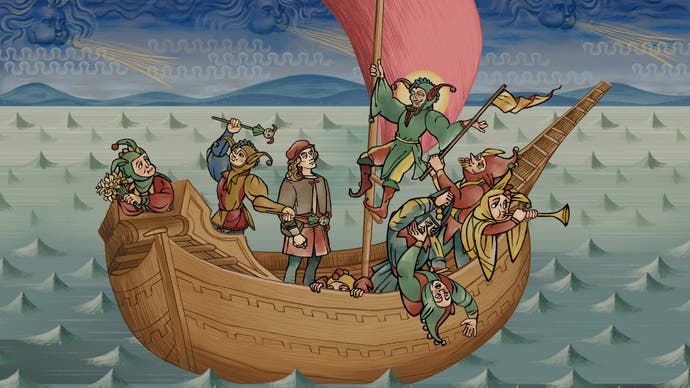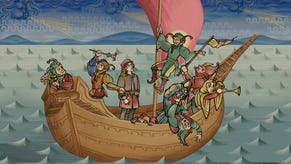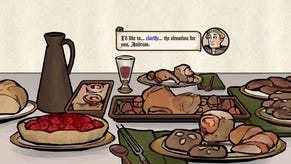Pentiment review - a 16th century mystery that blossoms with intrigue and human warmth
Compline department.
Pentiment sent me back to dig out my old copy of The Name of the Rose, and not merely because it's another murder-mystery - of a kind - set in and around a medieval monastery. It's mostly because there's a lovely passage on pens early on in Umberto Eco's book that I wanted to remind myself of.
Here it is, nestled in the fake introduction, which suggests that this careful clockwork novel you're about to read is in fact a true story, a haphazard manuscript that has fallen into the hands of an academic, who has merely provided a translation:
"[In] almost a single burst of energy, I completed a translation, using some of those large notebooks from the Papetiere Joseph Gilbert in which it is so pleasant to write if you use a felt-tip pen."
In a book with a lot of extravagant writing - the first page of the novel proper takes you from the gospel of John to St Paul's letters in a single paragraph - there aren't many obvious fireworks in that simple sentence. Yet there's a lot to love, I think. There's not just the obvious delight in the sheer sensation of writing, but there's also the way the whole thing cuts through the book's many layers and, in doing so, makes us aware of them. In a book of cleverness and concealments, this tiny riff on stationery feels like someone is actually speaking to us directly, unveiled. This is a rarity in the world we're about to enter.
Pens and paper and layers of narrative, some of which cannot be trusted. This is Umberto Eco's novel, and it's also Pentiment, a "passion project" from Obsidian, made by a small team who are clearly in thrall to their subject. Pentiment, like The Name of the Rose, is a clever piece of storytelling that is also surprisingly easy to fall in love with. I fell for Pentiment over the course of a week, in fact: it lived with me as I played it, and it stayed with me once I'd put the controller down between sessions.
Pentiment is a narrative adventure game set in the sixteenth century. You wander about and talk to people and try to work out what's going on and what you might do about it. But let's linger just a little longer on the act of writing. Because, really, the pleasures and the politics of text and of books are everywhere here. For example: when we first meet the protagonist, the artist Andreas Maler, he is working in the scriptorium of Kiersau Abbey in Bavaria, in the room where monks create copies of the books that pass through the abbey and undertake copying commissions for others. This room and rooms like it were once key to the church's power. They owned the books and they made the books. And they could make books disappear.
More: the scriptorium itself, like the rest of the game's environments, is rendered flat and clean-lined, brushed with water colour, and Maler himself is a jointed paper puppet, a figure from a manuscript brought to creaking life with clothes lit by a gentle wash of paint and a face scratched in ink. It's a beautiful piece of synergy, this art: at times we get the thick lines of a Durer wood-cut, and at others, when we take in a whole town commons, say, we get the babbling domestic muddle of Breugel.
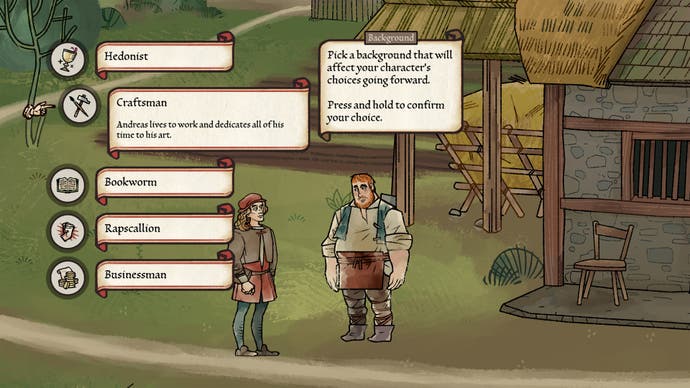
When Maler moves from one location to the next, the view pulls back and we briefly glimpse a page on which this scene is just a single picture slotted in amongst text and bizarre medieval marginalia - a hare smoking a pipe, a radish with arms and legs. There's a brisk snap of vellum as the page turns and we're off somewhere else: this process occurs so much during the game as Maler moves to and fro it becomes an all-but-invisible pace-setter for the adventure, like the turning of page after page when reading a novel.
And most importantly when it comes to text there's speech itself. Pentiment is a game conducted in conversations, and these conversations play out in medieval speech balloons, with each speaker given a font that offers clues to their world. From peasant cursive to ornate gothic fonts, the lettering is telling you a lot about the people speaking, their backgrounds, their senses of themselves. More: when they shout, the text grows agitated and shakes. When they are shocked, ink is splattered across the page. (I should add, in the accessibility menu you can still select Easy Read fonts to improve the legibility throughout.) Most movingly, some of the people whose conversations you experience as text reveal that they cannot themselves read or write. Text divides as well as unites here.
Pentiment keeps you busy early on while all this clever stuff soaks in. Maler is no monk, we learn. He is working at the Abbey and staying in the nearby town of Tassing while he completes his masterpiece, before moving on and setting up his own workshop. While he toils in the scriptorium, however, a murder is committed and a friend of his seems set up to take the blame. Maler must clear his friend's name by finding the real killer. Fine. we go into the depths of the monastery and the town beyond to talk to people, listen to what they know, what they suspect, what they fear.
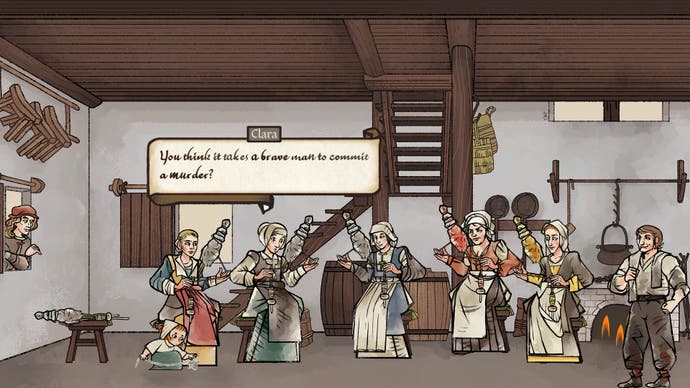
And so the game falls into a rhythm. Moving from Matins to Compline, we take Maler through this pocket of 16th century Bavaria meeting abbots and priests and farmers and midwives. Clues are there to be understood, codes need cracking, and yet Maler needs to eat, too, each meal a chance to sit down with different people and learn a bit more about their lives and any bearing their experiences might have on the case. (We learn more about them by what they serve, too - a tart bit of storytelling and world-building combines.)
It's lovely stuff, brisk and smartly written, with a range of voices coming through the endless scribbling of text. By my first evening, I had three or four promising suspects, and also a list of things that I felt I wanted to understand about the town and the way it worked - the many threads, economic and cultural that connected Tassing itself to Kiersau Abbey. Over the next few days I wandered the woods, conducted an autopsy, pondered a bit of grave robbing, learned my way around the abbey's corridors and cloisters, and eventually worked out who I thought was most likely to be responsible for the murder. All very Name of the Rose. Then the moment came when I had to explain my thinking. Job done. Case closed. Game over. I checked my watch: five hours or so. Not bad.
And then I got a big surprise. This wasn't the end of the game, but rather the end of the first act. Pentiment is a bit of a Name of the Rose simulator, in other words, but it gets through a lot of that in the opening third. Then it leaps forward in time and becomes something stranger and richer. Maler returns to Tassing older and - perhaps - wiser, a successful artist with his own apprentice. Where can the game possibly go from here? Isn't everything solved and sorted away? It isn't, of course, and the game blossoms.
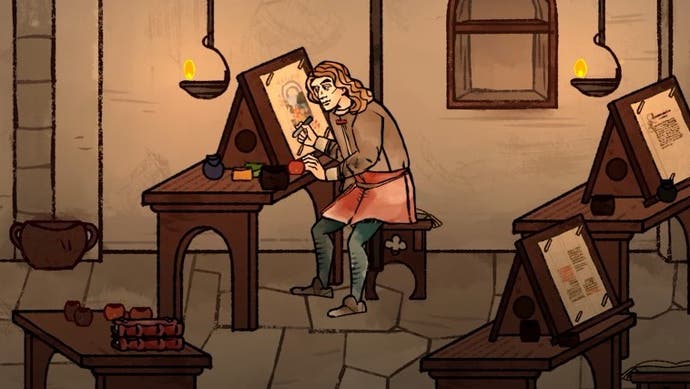
This is where Pentiment truly lives, I think, in the following two acts which build ingeniously on the first, the narrative stitching itself around whatever decisions your particular Maler made, and whoever he decided was ultimately responsible for the crime. And this is what I didn't initially understand: Pentiment isn't primarily interested in who murdered who - I've spoken to other people playing the game and we all picked a different culprit at the end of act one. It's interested in the impact of crimes and their punishments on a small community.
In fact, make this two things I didn't understand. Pentiment might riff on the central ideas of The Name of the Rose - and, actually, throughout its run, obvious name-checks aside it does cover much of the same territory too - but it's set two centuries after Eco's book. The Name of the Rose takes place in 1327, deep in the medieval world. Reason always gives way to dogma, and the protagonist William of Baskerville's links to a progressive figure like Roger Bacon make him suspicious to a lot of people in the church, who are always on the lookout for witchcraft.
Pentiment, meanwhile, begins in 1518. Its world may look purely medieval, but in fact the Renaissance is well under way in both Southern and Northern Europe. In 1518, Leonardo had only a year to live, while Durer had already completed his Melencolia. Much of the world may have seemed the same to one Bavarian farmer as it might have looked generations before - this is an idea Pentiment gets a lot of bitter truth out of, plus ca change etc. - but for some people in society things were actually changing pretty fast. Empiricism was on the rise, Martin Luther - much discussed in Pentiment - was challenging the existing church, and print was transforming the intellectual life of Europe.
Look deeper and you see this last point particularly clearly in Pentiment. The abbey's Scriptorium is one of the last ones still operating, and when it goes, the church's control of books and information will be gone for good. In the town of Tassing there are already printers working, allowing ideas to travel faster and further. On a certain level, this is what Pentiment is really concerned with: who gets to decide what is true? Who gets to write it down, and what lies beneath those words?
And what is the cost? This might be the game's masterstroke. When my Maler returned to Tassing at the start of act two, I realised that my experience of him had changed. The first act had been a youthful blur, and it had given me room to make childish mistakes with Maler that were not forgotten. In fact, I would have to revisit them, and navigate by them, for the rest of my Maler's life.
From that point on Pentiment goes both forwards and backwards - forward through Maler's life and its new challenges, and backwards into the world of Tassing, in search of deeper, more fundamental mysteries. What lies beneath? Pentiment asks, and only at the very end of the adventure did I feel like the game faltered a little. An experience that was all about making up my own mind suddenly decided to do a bit too much of my thinking for me.
Does this matter? Not really - and maybe I just need to think about the ending some more anyway. There's an awful lot to think about in Pentiment, after all. I'll carry memories of the afternoons I spent in the woods with a local gossip, of the secret passageways I discovered, the ghost I may have seen, and the night I lingered in the tavern surrounded by people I really started to feel like I knew.
And this is the trick, isn't it? The same trick that The Name of the Rose plays. Eco's novel is dense and complex and theoretically slightly off-putting. Do I really want to read a 400 page novel that spends so much time banging on about Thomas Aquinas? A book that has footnotes in Latin which it doesn't bother to translate? But you give it a go - a page or two - and the complexity reveals itself to be a kind of inviting richness. You get drawn in despite yourself to a treatise on semiotics that is simultaneously a great detective novel and a treasure hunt.
Pentiment works the same magic. Five minutes in I was wading through a tense disagreement on Martin Luther and wondering if this game was for me, but Obsidian draws you into this world by making it human, and by making it funny and kind and surprising and awful. And more: while I played Pentiment, the richest man in the world was muddling about at Twitter like a bored cat with a ball of crumpled paper, and this 16th century narrative of who gets to decide what is history, of who controls the flow of information, seemed surprisingly timely.
